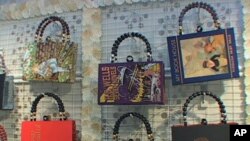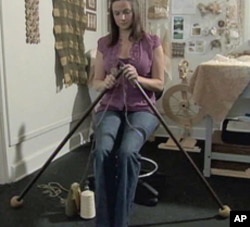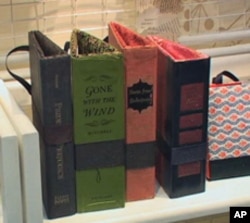Jamie Galloway is an eco-friendly fiber artist.
A recent graduate of the Savannah College of Art and Design, she was among 700 exhibiters at the American Craft Council Show in Baltimore, Maryland displaying their handmade jewelry, clothing, and home décor.
Green spinner
Galloway used giant knitting needles the size of ski poles to make the scarf she's wearing, a technique she learned during an internship in the British West Indies working with cotton free of pesticides and chemicals.
"We cultivated the cotton, picked it, hand seeded it, and spun it," she says.
In her Savannah, Georgia studio, Galloway spins organic cotton that has a natural brown, green and yellow color. She says she plans to engage other spinners to follow her lead and help revive a folk tradition for people in communities across the state.
"People are starting to realize that our life is so fast-paced that we miss out on the things in life that mean the most, which is human connectedness and taking the time to enrich our culture as well as individuals and teaching the arts of handicraft such as hand spinning and or weaving or felting gives us that culture back."
Amy Faust is a jewelry maker from Oakland, California.
Recycled gems
The necklaces, bracelets, earrings and pins in the display cases in Baltimore are made from beach glass, recycled bottles, chipped dinner plates and pottery shards.
A customer is awed by a bracelet with a large pale green stone. Faust tells her it's crafted from a 1940s era Coca-Cola bottle. "I love the fact that this is recycled," the woman says.
Nothing goes to waste in her California studio where Faust works with the broken and chipped objects rescued from thrift stores, flea markets and garage sales and with precision tools fashions them into something new.
"I am really disturbed by waste," she says. "I recycle everything. I make the jewelry because I really love the colors. I love the materials, but I also really think that it's kind of a vehicle to talk about recycling and how you can reuse things and inspire people. And, if I wear a necklace with a coke bottle, people come up to me and ask, 'What is that gem stone?'"
Poetic purses
Like Amy Faust, Caitlin Phillips thinks recycling is central to everything she does. Phillips turns discarded books into purses.
Phillips, who once worked in a used bookstore, loves old science and math textbooks. Her favorites are ones with bold colors from the 1960s. "People will say, 'Why are you carrying a geometry book to a party? And I'll reply: 'It's not a book. It's my purse!'"
Any old book will do, from Jane Austen, Sherlock Holmes and the complete works of Shakespeare to "Alice's Adventures in Wonderland" and the "Chicago Manual of Style" for writers and editors. Phillips helps customers match a memory or a mood. Little details matter to Phillips.
She tells the buyer about the vintage button that closes the purse, explaining that she picked it up from a lady selling mounds of buttons at Eastern Market in Washington, D.C. "So I picked this one out and found the right book for it."
Phillips works out of her home in Mt. Rainier, Maryland, which has that musty smell of a used bookstore. "That's my favorite thing, that smell," she says. "It's a dust smell and essentially a smell of decay when books have that old smell."
In her home studio Phillips has shelves lined with books waiting to be purses. She no longer feels guilty about tearing out all the pages. Her favorite part of the 12-hour process from pattern-to-purse is matching the fabric to the cover.
"If I don't find the right fabric, I don't make the purse. It has to look like the fabric almost grew out of the book. It's for the synergy of it. I mean otherwise, it's just fabric glued into a book. It's not special. So the fabric really makes a big difference."
The purses that Phillips crafts, like Jamie Galloway's organic cotton fabrics or Amy Faust's coke-bottle jewelry, are accessories that are both beautiful and functional.
Phillips says like any accessory, "If you are going to show off your books, why not take them with you?"







